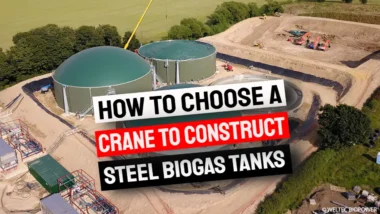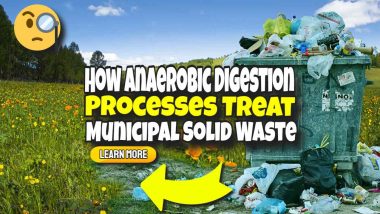Why should we wait for mainstream hydrogen vehicle technology when the use of biomethane can decarbonise big vehicles right now?
As the world grapples with climate change, the transportation sector is under immense pressure to reduce its carbon footprint. Heavy vehicles, such as trucks and buses, are significant contributors to greenhouse gas emissions.
While green hydrogen is often touted as the ultimate solution, the immediate benefits of using biomethane cannot be overlooked. In this article, we will explore the current state of biomethane technology, its availability, environmental benefits, and why it is a practical choice for logistics companies and fleet operators looking to decarbonize now.
The Current State of Biomethane Technology
Biomethane is derived from organic waste through a process called anaerobic digestion. This technology has matured significantly over the past decade, making biomethane a readily available and reliable source of renewable energy. Modern anaerobic digesters are increasingly efficient, producing biomethane with a high methane content that is suitable for use in heavy vehicles.

Availability of Biomethane
One of the key advantages of biomethane is its availability. Many countries have established biogas plants that convert organic waste into biomethane.
This means that logistics companies and fleet operators can access a steady supply of biomethane without the need for extensive infrastructure changes.
Additionally, biomethane can be transported through existing natural gas pipelines, further simplifying its adoption.
Environmental Benefits of Biomethane
Biomethane offers several environmental benefits. It is a carbon-neutral fuel because the carbon dioxide released during its combustion is offset by the carbon dioxide absorbed by the organic matter from which it is derived.
Moreover, using biomethane helps reduce methane emissions from organic waste, a potent greenhouse gas. This dual benefit makes biomethane an attractive option for immediate decarbonization.
Addressing Pressing Issues for Logistics Companies
For logistics companies and fleet operators, the transition to biomethane can solve several pressing issues:
Actionable Insights on Integration
Integrating biomethane into a fleet is relatively straightforward. Here are some actionable steps:
- Assessment: Conduct a thorough assessment of your current fleet to determine the feasibility of converting to biomethane.
- Infrastructure: If necessary, invest in refuelling infrastructure or partner with biomethane suppliers that offer refuelling services.
- Training: Train your drivers and maintenance staff on the specifics of handling biomethane-powered vehicles.
- Monitoring: Implement monitoring systems to track fuel usage and emissions reductions.
Real-World Examples of Successful Implementations
Several companies have successfully integrated biomethane into their fleets.
For example, the logistics giant DHL has been using biomethane-powered trucks as part of its GoGreen initiative. Similarly, the city of Stockholm has converted its entire public bus fleet to run on biomethane, significantly reducing its urban emissions.
The Challenges and Limitations of Waiting for Green Hydrogen
While green hydrogen holds promise as a zero-emission fuel, it is not yet a practical solution for several reasons:
- High Costs: Producing green hydrogen through electrolysis using current early versions of this equipment will remain expensive and energy-intensive until planned investment brings anticipated scale economies in production.
- Lack of Infrastructure: There are very few hydrogen refuelling stations, and new infrastructure is costly to build.
- Storage and Transport: Hydrogen is difficult to store and transport due to its low density and flammability, requiring specialized systems.
- Energy Efficiency: The process of producing, storing, and converting hydrogen is less efficient compared to direct electrification with batteries.
- Renewable Energy Demand: Green hydrogen production requires large amounts of renewable electricity, for the time being, competing with other energy needs.
- Competition: Battery electric vehicles (BEVs) have become more mature and are more efficient for most road transport applications, other than heavy transport.
These challenges must be addressed before green hydrogen becomes a viable mainstream solution.
Comparison Between Biomethane and Green Hydrogen
When comparing biomethane and green hydrogen, several factors favour biomethane as an immediate solution:
| Aspect | Biomethane | Green Hydrogen |
|---|---|---|
| Source and Production | Produced from organic waste via anaerobic digestion. | Produced by splitting water through electrolysis using renewable energy. |
| Carbon Emissions | Near-zero net carbon emissions if derived from waste. | Zero carbon emissions when produced using renewable energy. |
| Energy Density | Slightly lower energy density than natural gas. | Higher energy density per unit mass than biomethane, but lower by volume. |
| Infrastructure Readiness | Can be distributed through existing natural gas pipelines with minimal changes. | While mixed hydrogen and natural gas may be delivered via the natural gas grid, pure hydrogen requires new infrastructure (pipelines, refuelling stations, storage). |
| Vehicle Compatibility | Compatible with current CNG (Compressed Natural Gas) vehicles. | Requires dedicated hydrogen fuel cell vehicles (FCVs). |
| Efficiency | Internal combustion engines using biomethane have lower efficiency than fuel cells. | Hydrogen fuel cells are highly efficient compared to internal combustion engines. |
| Storage and Transportation | Easier to store as compressed gas; can be stored in existing CNG tanks. | Hydrogen is difficult to store and transport; it needs high-pressure tanks or cryogenic systems. |
| Environmental Impact | Reduces methane emissions from organic waste if captured. | No direct emissions, but hydrogen production through electrolysis is energy-intensive. |
| Cost | Lower cost due to well-established production and distribution networks. | Currently more expensive due to limited infrastructure and higher production costs. |
| Availability | Widely available from waste sources like landfills, wastewater, and agriculture. | Limited by the availability of renewable electricity for green hydrogen production. |
| Scalability | Scalable in areas with abundant organic waste. | Highly scalable with the expansion of renewable energy sources. |
| Vehicle Range | Comparable to natural gas vehicles; limited range. | Longer range than biomethane-powered vehicles. Hydrogen vehicles can travel hundreds of miles on a single tank. |
| Health and Safety | Considered safe, though like any flammable gas, it poses risks. | Hydrogen is highly flammable and needs robust safety measures, though technologies are improving. |
| Well-to-Wheel Efficiency | Lower than green hydrogen when comparing energy input to final energy output. | Higher well-to-wheel efficiency, especially in fuel cell applications. |
Conclusion
In conclusion, while green hydrogen may be a long-term solution for decarbonizing heavy vehicles, biomethane offers immediate benefits that cannot be ignored. Its availability, environmental benefits, and cost-effectiveness make it a practical choice for logistics companies and fleet operators looking to reduce their carbon footprint today.
By adopting biomethane now, businesses can achieve significant emissions reductions, comply with regulations, and position themselves as leaders in sustainability. The time to act is now – start transitioning your fleet to biomethane and reap the benefits of a cleaner, greener future.
We say:
“Why would anyone wait for an as-yet unproven new technology to start serious decarbonisation when there is a tried and tested method available right now?”
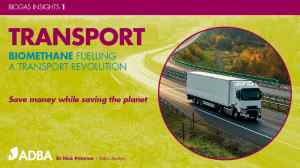 There is much popular pressure for the UK government to go faster to net-zero than 2050, but speeding up decarbonisation via other technologies will be much harder to achieve quickly. Read the ADBA Press Release below to find out why:
There is much popular pressure for the UK government to go faster to net-zero than 2050, but speeding up decarbonisation via other technologies will be much harder to achieve quickly. Read the ADBA Press Release below to find out why:
ADBA Press Release 23 June 2021:
“Biomethane the key option to decarbonise heavy vehicles immediately,” says trade body in a new publication:
- Biomethane: Fuelling a Transport Revolution reviews how the anaerobic digestion and biogas industry can help decarbonise heavier modes of transport, such as trucks and buses, much sooner than electricity or hydrogen.
- The Policy Briefing report by the Anaerobic Digestion and Bioresources Association (ADBA) details the GHG emissions issues facing the UK transport sector and explores the solutions available for heavy goods and public transport vehicles, which alone generate 20% of current emissions per year.
- Rapid deployment of biomethane for HGVs could reduce GHG emissions by 38% over the next 10 years. Current technological barriers to powering heavy vehicles with electricity or hydrogen mean these future fuels could only cut emissions by 6% over the same period.
- Major fleet operators are already making the transition to biomethane trucks and buses.
- Fuelling HGVs with biomethane can cut well-to-wheel emissions by 80% per km driven and greatly improve air quality.
- As well as decarbonising transport, biomethane can boost an entire economic sector, with ROI for hauliers achieved within two years of operation.
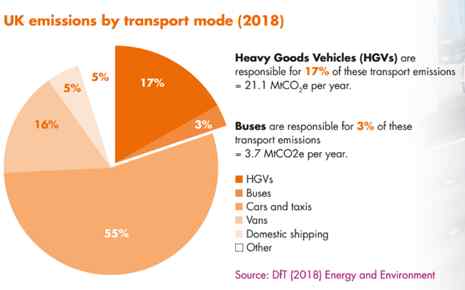
Earlier this month, the Anaerobic Digestion and Bioresources Association (ADBA) launched a Policy Briefing report demonstrating the crucial role biomethane could play in decarbonising transport in the UK in the short term.
In the first of a series of Policy Briefing Events, the trade body presented: Biomethane: Fuelling a Transport Revolution. A report that analyses the UK transport sector's issues facing the by exploring the options presented by electric vehicles, hydrogen and biomethane.
The research highlights the value of biomethane in providing a green fuel alternative for heavy good and public transport vehicles – immediately.
Trucks and buses currently generate 20% of the UK's greenhouse gas emissions from transport, which is itself the highest GHG emitting sector in the UK (27%).
“ Transport is the most polluting sector and its GHG emissions levels have not changed over the past decade. “
, explains Charlotte Morton, ADBA's Chief Executive.
“Biomethane is ready to be produced, ready to be used, and can decarbonise heavy vehicles transport here and now. At a time when the pollution levels exceed WHO guidelines on 97% of UK roads, we can not afford to wait 15-20 years for electricity or hydrogen solutions to become ready.“
A 2020 report by Element Energy shows that rapid deployment of biomethane for HGVs would reduce emissions by 38% over 10 years, whilst waiting for hydrogen/electric HGVs to be manufactured would deliver only 6% over the same period.
Biomethane is particularly appropriate for public transport, long-haul logistics and food distribution vehicles. Household names and cities such as ASDA, Royal Mail, Nottingham City Transport and Liverpool City Council are already making the transition for their delivery fleets and buses.
The report reveals that fuelling HGVs with biomethane can cut well-to-wheel emissions by 80% per km driven, compared to diesel, and that the Return On Investment (ROI) for fleet operators is achieved within two years.
“Using biomethane as a transport fuel is an immediate “no regrets” option that not only contributes to significant cuts in GHG emissions from HGVs but also stimulates continued growth in the UK biomethane sector,”
says Philip Fjeld, CEO of CNG-Fuels.
“As the refuelling network expands across the UK, biomethane as a transport fuel will become a win-win solution that is available to all hauliers and that continues to reduce the carbon footprint of a sector that has always been seen as very hard to decarbonise“.
With the launch of the CNHi Biomethane tractor and small scale on-site methanation units, agriculture could be the next sector to benefit from the availability of biomethane to reduce its GHG emissions.
Therefore, the biomethane sector is primed to play an increasingly crucial role in helping the UK achieve its Net Zero targets by 2030.
DOWNLOAD THE ADBA POLICY BRIEFING
Biomethane: Fuelling the Transport Revolution
– ADBA PR ENDS –
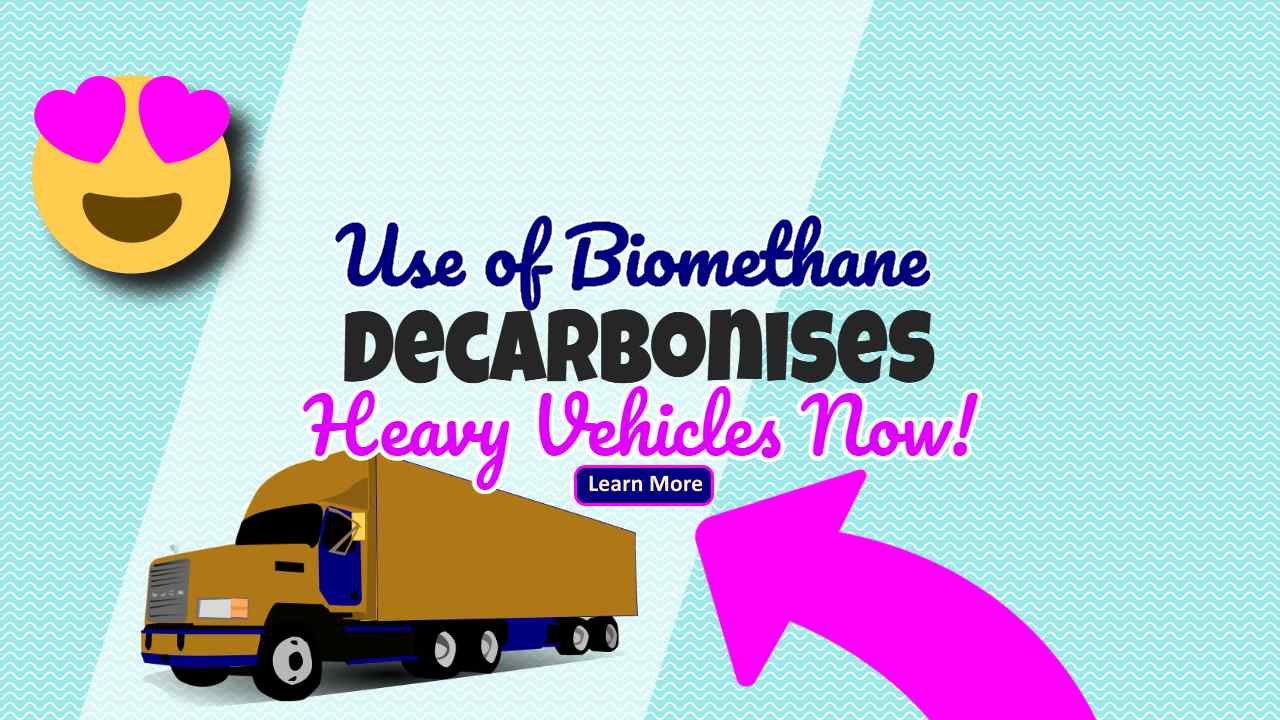
For further information, contact:
Jocelyne Bia, Senior Communications Consultant
email: Jocelyne.bia@adbioresources.org ; tel: 00 44 7910 878510
[Article first posted 24 June 2021. Updated September 2024.]



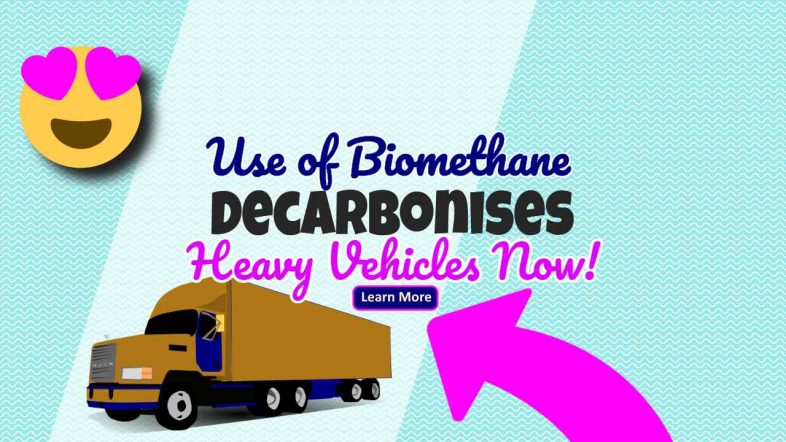
 “ Transport is the most polluting sector and its GHG emissions levels have not changed over the past decade. “
“ Transport is the most polluting sector and its GHG emissions levels have not changed over the past decade. “